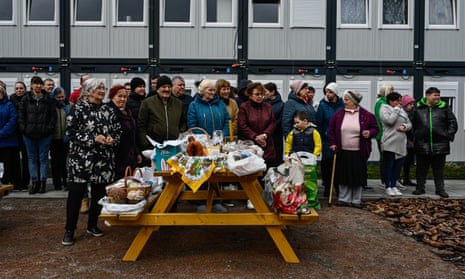Ukraine ‘operation’ is ‘difficult’ says Kremlin spokesperson
Russia’s military operation against Ukraine is “very difficult” but will continue, Tass news agency cited Kremlin spokesman Dmitry Peskov as telling a Bosnian television station on Wednesday.
Russia has succeeded in severely damaging the Ukrainian military machine and this work will continue, he added, in a long interview during which he repeated many of Moscow’s talking points about the conflict.
“The special military operation continues. This is a very difficult operation, and, of course, certain goals have been achieved in a year,” Tass quoted Peskov as saying.
Ukraine continues to shell eastern parts of the country occupied by Russia and Peskov said this demonstrated the need to continue the conflict and push pro-Kyiv forces back, Reuters reports.
“We managed to beat up the Ukrainian military machine quite a bit,” said Peskov, noting Russia had launched countless missile strikes against what he said were military targets across Ukraine.
“This work will continue,” he said. Ukraine accuses Russia of targeting mainly civilian targets, a charge Moscow denies.
Key events
US approves transfer of seized Russian assets for use in Ukraine
The US attorney general, Merrick Garland, has authorised the first transfer of forfeited Russian assets for use in Ukraine, he said on Wednesday.
Reuters reports the Justice Department last year charged the Russian oligarch Konstantin Malofeyev with violating sanctions imposed on Russia after its invasion of Ukraine, saying he provided financing for Russians promoting separatism in Crimea.
At that time, Garland said, he also announced “the seizure of millions of dollars from an account at a US financial institution traceable to Malofeyev’s sanctions violations”.
In February, Garland said he authorised the transfer of that money for use in Ukraine.
“While this represents the United States’ first transfer of forfeited Russian funds for the rebuilding of Ukraine,” Garland said, “it will not be the last,” he said in a statement.
Here is our full report on the record rise in the number of displaced people worldwide:
Kremlin calls Poland’s decision to rename Kaliningrad a ‘hostile act’
The Kremlin has described Poland’s decision to rename the Russian city of Kaliningrad in its official documents as a “hostile act”, as ties continue to fray over the Ukraine war.
Kaliningrad, which sits in an exclave sandwiched between Lithuania and Poland on the Baltic coast, was known by the German name of Königsberg until after the second world war, when it was annexed by the Soviet Union and renamed to honour politician Mikhail Kalinin.
On Wednesday, Poland’s development minister, Waldemar Buda, said Kaliningrad would now officially be called Królewiec, its name when it was ruled by the Kingdom of Poland in the 15th and 16th centuries.
“We do not want Russification in Poland and that is why we have decided to change the name in our native language of Kaliningrad and the Kaliningrad region,” Buda said.
Warsaw says Kalinin’s connection to the 1940 Katyn massacre – when thousands of Polish officers were executed by Soviet forces – had negative connotations.
More now on what has been happening in Zaporizhzhia: The Moscow-installed governor of the region ordered civilian evacuations from the area last Saturday, including from the nearby city of Enerhodar where most plant workers live. The full scope of the evacuation order was not clear.
Russian forces seized the Zaporizhzhia plant days after Russian president, Vladimir Putin, ordered the invasion of Ukraine in February 2022. Russian occupiers left the Ukrainian staff in place to keep the plant running but the exact number of workers currently at the plant is not known.
Fighting near the plant has fuelled fears of a potential catastrophic incident like the one at Chornobyl, in northern Ukraine, where a reactor exploded in 1986 and contaminated a vast area in the world’s worst nuclear accident.
Zaporizhzhia is one of the 10 biggest nuclear plants in the world. While its six reactors have been shut down for months, it still needs power and qualified staff to operate crucial cooling systems and other safety features.
Number of internally displaced people reaches record worldwide
The number of internally displaced people reached a record 71.1 million worldwide last year due to conflicts such as the war in Ukraine and climate calamities like the monsoon floods in Pakistan, according to data published on Thursday and reported by Reuters.
The Geneva-based Internal Displacement Monitoring Centre said that figure represented a 20% increase since 2021. The IDMC said that nearly three-quarters of the world’s displaced people live in 10 countries, including Syria, Afghanistan, the Democratic Republic of the Congo, Ukraine and Sudan, due to conflicts that prompted significant displacement in 2022.
The war in Ukraine triggered nearly 17 million displacements last year, it said.

“Conflict and violence triggered 28.3 million internal displacements worldwide, a figure three times higher than the annual average over the past decade,” it said.
But the bulk of displaced people last year – 32.6 million – was due to disasters including floods, droughts and landslides.
“The war in Ukraine also fuelled a global food security crisis that hit the internally displaced hardest. This perfect storm has undermined years of progress made in reducing global hunger and malnutrition,” said Jan Egeland, secretary general of the Norwegian Refugee Council.
Zaporizhzhia nuclear plant facing ‘catastrophic’ staff shortage
Russia plans to relocate about 2,700 Ukrainian staff from Europe’s largest nuclear plant, Ukraine’s atomic energy company has claimed, warning of a potential “catastrophic lack of qualified personnel” at the Zaporizhzhia facility in Russian-occupied southern Ukraine.
Workers who signed employment contracts with Russia’s nuclear agency Rosatom following Moscow’s capture of the Zaporizhzhia plant early in the war are set to be taken to Russia along with their families, Energoatom said in a Telegram post on Wednesday.
The company did not specify whether the employees would be forcibly moved out of the plant, nor was it immediately possible to verify Energoatom’s claims about Moscow’s plan.
Removing staff would “exacerbate the already extremely urgent issue” of staff shortages, Energoatom said.
Russian forces ‘constrained’ in Bakhmut, says ISW
Moscow’s forces in Bakhmut are constrained by “pervasive issues with Russian combat capability”, the Institute for the Study of War, a US thinktank, has warned. “Continued attritional assaults” by Ukraine are futher limiting Russia’s progress in the city, the ISW said.
On Wednesday a Ukrainian military unit said it had routed a Russian infantry brigade from frontline territory near Bakhmut, claiming to corroborate an account by the head of Russia’s Wagner group that the Russian forces had fled.
Later on Wednesday, Col Gen Oleksandr Syrskyi, who heads Ukraine’s ground forces, said Russian units in some parts of Bakhmut had retreated by up to 2km (1.2 miles) as the result of counterattacks. He did not give details.
Wagner units have led a months-long Russian assault on the eastern city, but Ukrainian forces say the offensive is stalling.
The ISW said in its daily update late on Wednesday:
Pervasive issues with Russian combat capability, exacerbated by continued attritional assaults in the Bakhmut area, are likely considerably constraining the ability of Russian forces in this area to defend against localized Ukrainian counterattacks. […] Issues with the ad hoc commitment of various depleted force groupings to the Bakhmut axis, alongside apparent command and control failures, are likely preventing Russian forces in the area from conducting sound defensive operations.
Ukraine ‘operation’ is ‘difficult’ says Kremlin spokesperson
Russia’s military operation against Ukraine is “very difficult” but will continue, Tass news agency cited Kremlin spokesman Dmitry Peskov as telling a Bosnian television station on Wednesday.
Russia has succeeded in severely damaging the Ukrainian military machine and this work will continue, he added, in a long interview during which he repeated many of Moscow’s talking points about the conflict.
“The special military operation continues. This is a very difficult operation, and, of course, certain goals have been achieved in a year,” Tass quoted Peskov as saying.

Ukraine continues to shell eastern parts of the country occupied by Russia and Peskov said this demonstrated the need to continue the conflict and push pro-Kyiv forces back, Reuters reports.
“We managed to beat up the Ukrainian military machine quite a bit,” said Peskov, noting Russia had launched countless missile strikes against what he said were military targets across Ukraine.
“This work will continue,” he said. Ukraine accuses Russia of targeting mainly civilian targets, a charge Moscow denies.
Opening summary
Hello and welcome back to our continuing live coverage of the war in Ukraine. This is Helen Sullivan with the latest.
Our top stories this morning: Russia’s military operation against Ukraine is “very difficult” but certain goals have been achieved, Tass news agency cited Kremlin spokesperson Dmitry Peskov as saying on Wednesday.
Russia has succeeded in severely damaging Ukraine’s military machine and this work will continue, he added.
Meanwhile, the Institute for the Study of War, a US thinktank, says Russian forces appear to be “constrained” in Bakhmut because of what it called ‘pervasive issues with Russian combat capability”.
We’ll have more detail for you shortly. In the meantime, here are the key recent developments in the war:
-
A Ukrainian military commander has said that Russian forces in Bakhmut had been pushed back by up to 2km in some areas, after counter offensives. Col Gen Oleksandr Syrskyi, who heads Ukraine’s ground forces, made the comments in a post on Telegram. He said: “In some areas of the front, the enemy could not resist the onslaught of the Ukrainian defenders and retreated to a distance of up to two kilometers.”
-
Russia’s oil pipeline operator Transneft said that a filling point on the Europe-bound Druzhba pipeline in a border area between Russia and Ukraine had been targeted in a “terrorist” attack, according to the Tass news agency. Transneft said nobody was injured in the incident, which it called a “terrorist attack”, according to Reuters.
-
It comes as Ukraine’s military said its forces have seriously damaged Russia’s 72nd independent motorised rifle brigade near Bakhmut, made up of thousands of troops. Serhiy Cherevatyi, a spokesperson for Ukrainian troops in the east, said the situation remained “difficult” in Bakhmut but Moscow was increasingly forced to use regular army units because of heavy losses among the Wagner private army group.
-
France’s anti-terrorism prosecution office on Wednesday announced it had opened an investigation for possible war crimes and crimes against humanity after an AFP video journalist was killed on Tuesday by Grad rocket fire near Chasiv Yar, in eastern Ukraine.
-
Turkish Foreign Minister Mevlut Cavusoglu said on Wednesday he thought the Ukraine Black Sea grain deal could be extended for at least two more months, as officials held the first day of talks on an extension in Istanbul. Russia has said it would not extend the pact beyond 18 May unless a list of demands is met to remove obstacles to its own grain and fertiliser exports. Cavusoglu was speaking to reporters on his return from a trip to Moscow.
-
Russian forces are planning to “evacuate” more than 3,000 workers from the town that serves the occupied Zaporizhzhia nuclear power plant, resulting in a “catastrophic lack” of personnel, Ukraine’s state-owned Energoatom company claimed on Wednesday.
-
Former German chancellor Gerhard Schröder has been criticised again for his links to Russia after attending a Victory Day party at the Russian embassy in Berlin. Schröder was seen at the reception on Tuesday marking the defeat of Nazi Germany in the second world war, along with senior figures from the far-right Alternative for Germany party and the far-left Linke party.
-
Russia may formally “denounce” the treaty on conventional armed forces in Europe that it pulled out of in 2015, according to a decree signed by President Vladimir Putin on Wednesday.

